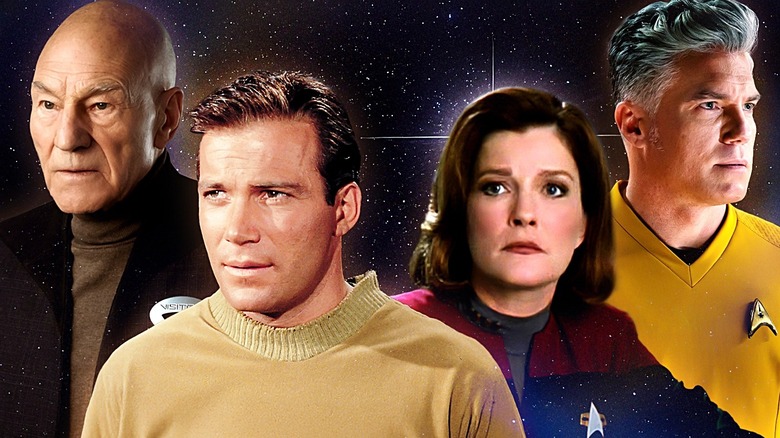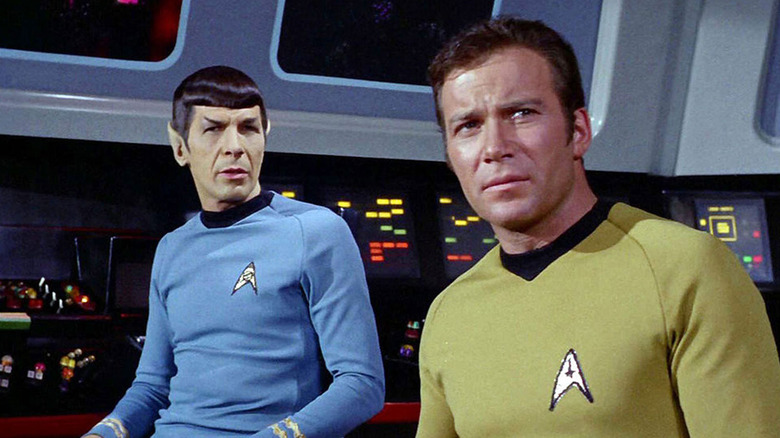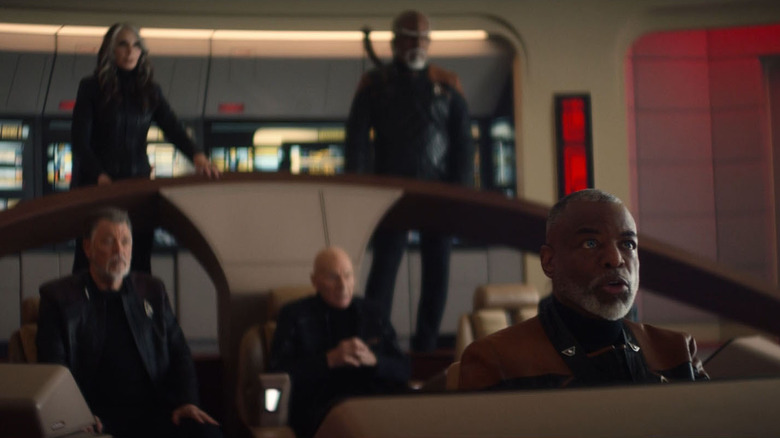Star Trek's Best Era Of TV Shows, According To Rotten Tomatoes
If there's one things Trekkies love to do, it's have heated debates about "Star Trek." Get five or six Trekkies in a room, and you'll soon find them arguing over which captain is the best, which Enterprise looks the coolest, or which "Star Trek" series had the best writing. Heck, many Trekkies will even argue over the core tenets of the franchise, debating how utopian it actually is. Gloriously, no conclusions will be reached. Tempers will flare, harsh words will be swapped, and no one will emerge a victor. And yet, through these debates, new friendships form, and everyone has a chance to consider new viewpoints on the sci-fi series they have devoted themselves to.
Which "Star Trek" series is the best? That question may never be answered. After all, there are 12 extant "Trek" shows to choose from. 13, if you count "Very Short Treks" as its own entity, and 14 if you want to jump ahead and include the still-in-production "Starfleet Academy."
(The correct answer, by the way, is "Star Trek: The Next Generation." That's a fact. Begin debate.)
One can, however, get a general line on the quality of "Star Trek" by looking at reviews. Thanks to Rotten Tomatoes, modern audiences have been able to cull a percentage of "positive" and "negative" reviews of TV shows, giving every "Star Trek" series a seemingly objective approval rating (although, to be clear, you should never rely solely on Rotten Tomatoes). And judging by the approval ratings on Rotten Tomatoes, one can ostensibly suss out what the best "Star Trek" shows are, and, even more generally, when the best "Star Trek" shows came out.
By that measure, three of the five best-reviewed "Star Trek" shows were released after 2017, when the franchise moved to the then-new CBS All Access streaming service, later known as Paramount+. Overall, the newer Trek shows are higher-rated than the classics, meaning that the best era of the show is the most recent one.
Old Trek vs. Nu-Trek
What are the three "eras" of "Star Trek?" Let me take you on an eras tour.
Nu-Trek (2017-present)
In 2017, writer and filmmaker Alex Kurtzman had taken over the franchise as executive producer, so some Trekkies refer to the new wave of Trek shows as the Kurtzman Era. Others say we're in the Paramount+ Era, referring to any of the shows that debuted since 2017 (which is a lot: six shows have started up in the last seven years). Other still merely call it "Nu-Trek" as a way to differentiate the new creative team from the old one.
'90s Trek (1987-2005)
The previous era of "Star Trek" shows lasted from the debut of "Star Trek: The Next Generation" in 1987 to the cancelation of "Star Trek: Enterprise" in 2005, most of which was overseen by executive producers Rick Berman and Michael Piller. That era also included "Star Trek: Deep Space Nine" and "Star Trek: Voyager," and many Trekkies consider this 18-year period — '90s Trek — to be the franchise's heyday. Series creator Gene Roddenberry worked heavily on "Next Generation" in the last years before his death.
Classic Trek (1966-1991)
The Classic Era of Trek involves the original 1966 TV series, the 1973 animated series, and the first six feature films, all featuring the same cast. Old School Trekkies recall the original era with fondness.
Rotten Tomatoes has ranked all of the "Star Trek" series to date (sans "Short Treks") by their overall critical approval rating, and has found that "Star Trek: Strange New Worlds" (2022-present) is the highest, with a 98% approval rating. In second, curiously, is the short-lived animated series "Star Trek: Prodigy" (2021-2024) with a 97% approval. In fifth was "Star Trek: Lower Decks" (2020-2024), sporting a 91% approval. With three Nu-Trek shows in the top five, it appears that newer Trek shows are more celebrated than older ones.
Yes, there are extenuating factors
Of course, there are many variable factors to include here. Rotten Tomatoes, for instance, didn't launch officially until 2000, and didn't become a remarkable cultural force until about 2003 or 2004. The site has more reviews of newer films than of older ones, which is going to weight approval ratings. "Strange New Worlds," for instance, has 87 reviews, while "Star Trek: The Animated Series" (ranked third, with a 94% approval rating) only has 18. Also, a lot of the newer shows' approval ratings are based only on reviews of their first few episodes, and don't stand as an overall litigation of the series in question, ex post facto. The '90s shows were judged as a whole, while "Strange New Worlds" was judged by maybe five episodes.
"Star Trek: The Next Generation" was fourth on the RT list with a 91% approval rating, while "Deep Space Nine" almost tied "Lower Decks" with 91% approval, only with fewer reviews.
Curiously, less appealing Nu-Trek shows like "Star Trek: Discovery" and "Star Trek: Picard" still garnered a lot of positive response, at least initially. "Picard" has an approval rating of 89%, bringing it in at #7, while "Disco," the first Nu-Trek series, is in 8th with an 84. These shows are hotly contested, and /Film has gone on record as to why they don't work very well. Coming in behind them, rather bafflingly, was the original 1966 "Star Trek" series, boasting a mere 80% approval. That is based on 42 reviews, though, some of them vintage.
At the bottom of the list is "Star Trek: Voyager" (76%) at #10, and finally, at #11, "Star Trek: Enterprise" (56%).
Nu-Trek shows can brag about this: On average, they have a 91.8% approval. Fans of the two original shows can take solace in the knowledge that their average is 87%, but '90s Trek fans will be hurt to learn that their four shows average out to 78.75%.


